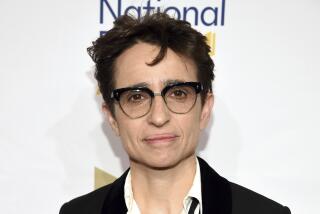Polish Leader’s Victory in Libel Case Called ‘Black Day’ for Democracy
WARSAW — In a landmark case against Polish press freedoms, a Warsaw district court ruled Monday that journalists can be punished for libel even if they have made good-faith efforts to research and document allegations against public figures.
Polish President Aleksander Kwasniewski, a former Communist, had demanded an apology and about $600,000 in damages for a 1997 article in the right-leaning newspaper Zycie alleging that he met with a top Russian spy at a Baltic Sea resort in 1994, before becoming president. He won a verdict that the newspaper had published “untruthful information” and must publish a front-page apology and retraction. He also won court costs but no damages.
“This is a black day for Polish journalism and Polish democracy,” Tomasz Wolek, editor of Zycie, said after the verdict. “It’s not important that the court decided not to make a financial award. . . . If [the verdict] remains in force, it will create an atmosphere of concern: ‘Should I take the risk of criticizing officials?’ There can be this kind of self-censorship, where people are afraid.”
The newspaper will appeal the verdict, Wolek said.
During the lengthy trial, Zycie produced numerous witnesses who testified that Kwasniewski had been at the Polish resort at the same time as the Russian spy, Vladimir Alganov, a longtime diplomat in Warsaw who, by 1996, was known to have been an intelligence agent. The newspaper also produced documentation that Kwasniewski had paid a hotel bill at the resort for the period.
However, three sources who had told Zycie’s reporters that they saw Kwasniewski and Alganov together failed to testify to that effect at the trial, said Rafal Kasprow, one of the reporters who wrote the story. One source didn’t testify at all, another said in court that he didn’t remember anything, and the third testified that she saw both Kwasniewski and Alganov but couldn’t remember if they were together, Kasprow said.
Kwasniewski’s side countered the allegations with testimony and documentary evidence that he had not been at the resort at all during the time in question, although he acknowledged that his family had been there and that he had paid a hotel bill for the period.
“We haven’t had such a trial in Poland in the past 10 years,” said Andrzej Goszczynski, director of the Assn. of Polish Journalists’ Free Press Monitoring Center. “Our concern from the beginning of this trial was that this was the head of state who asked for the proceedings. In modern democracies, this doesn’t happen. This trial is of colossal importance to the future of the media in Poland, especially for the citizens’ right of access to information.”
Under U.S. laws protecting freedom of the press, a public figure would have great difficulty winning a libel suit in a case in which there is no evidence that the journalists showed malice or a reckless disregard for the truth, and where the publication could produce numerous witnesses willing to testify. Polish law, however, lacks such clear protections for journalistic coverage of public figures.
Presidential lawyer Ryszard Kalisz praised the decision for confirming that “freedom of speech ends where lies begin.”
“Freedom of speech is also associated with responsibility for the truth,” Kalisz said. “It signifies that those who lie must take full responsibility for their actions.”
At a news conference after the verdict, Wolek questioned why so much of Kwasniewski’s evidence consisted of photocopies rather than original documents. He said the newspaper still believes its witnesses.
In denying damages, the court noted that Kwasniewski enjoys high popularity and said this shows that his reputation had not been damaged by the article. Recent polls show him with about 60% support. Kwasniewski is expected to run for another five-year term later this year and is considered a strong favorite to win.
More to Read
Sign up for Essential California
The most important California stories and recommendations in your inbox every morning.
You may occasionally receive promotional content from the Los Angeles Times.










